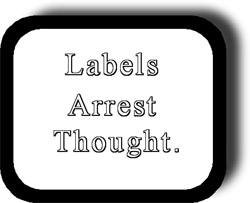
Labels, stereotypes, abbreviations, shorthands, and heuristics are bad trade-offs. They speed communication and muddy it at the same time. Worse, once we apply the label, we stop thinking.
Start with something easy, like politics. When you label someone republican or democrat; conservative or liberal, you have defined him or her, right? All democrats are identical and republicans are all clones. Conservatives all think one way, and liberals all think another. Intellectually, we know this is ridiculous but we communicate as though it were true.
Even when label contains a kernel of truth about an individual, stereotypes are never true about the whole group. The Mafia was populated predominately by Italians. If you are of Italian descent, do you like it if people assume you are a gangster? Just because you are African-American, does that mean you have great body control and rhythm (just like Mike...you wish!) Do you really think that a billion-plus people all want to blow up the USA, just because a handful of Muslims do?
Labeling is used so often because it is so efficient. Calling someone a conservative is much easier and quicker than describing in detail that person's positions on abortion, fiscal policy and national security. We apply the label; then we stop thinking about who the person really is and what he or she believes.
Labeling is a particularly dangerous behavior in health care, and yet it is considered proper and necessary behavior. In health care, labeling or stereotyping is called making a diagnosis.
Making a diagnosis implies to both providers and patients that problem is understood. Consider some common diagnoses (or labels) that you see in TV advertisements by pharmaceutical companies selling drugs directly to consumers or by lawyers recruiting clients for class action suits.
•Fibromyalgia (= pain in joints and muscles. The mechanism of disease is a mystery.)
•Mesothelioma (= cancer of the lining of the lungs, often follows exposure to asbestos. How does the asbestos produce the tumor? Your guess is as good as mine.)
•Erectile dysfunction (The "what" is obvious. The "why" is unknown.)
We do not know the causes of any of the above. Bluntly, we do not know the causes of most medical conditions. Giving something a scientific label, like systemic hypertension or cardiomyopathy, implies that knowledge exists which does not. Just because a diagnosis or label is given to a patient does not mean that medical science understands what is wrong. However, people think it does and therefore, they no longer need to keep an open mind or to think.
We cannot cure anything, from a headache to our healthcare system, without knowing the cause of problems. If we believe that the label defines the person and the diagnosis infers the cure, then we cease thinking. If we do not think, we will never cure.
View this post like a warning on a bottle of medicine.
"BEWARE! Labeling can be hazardous to thinking."